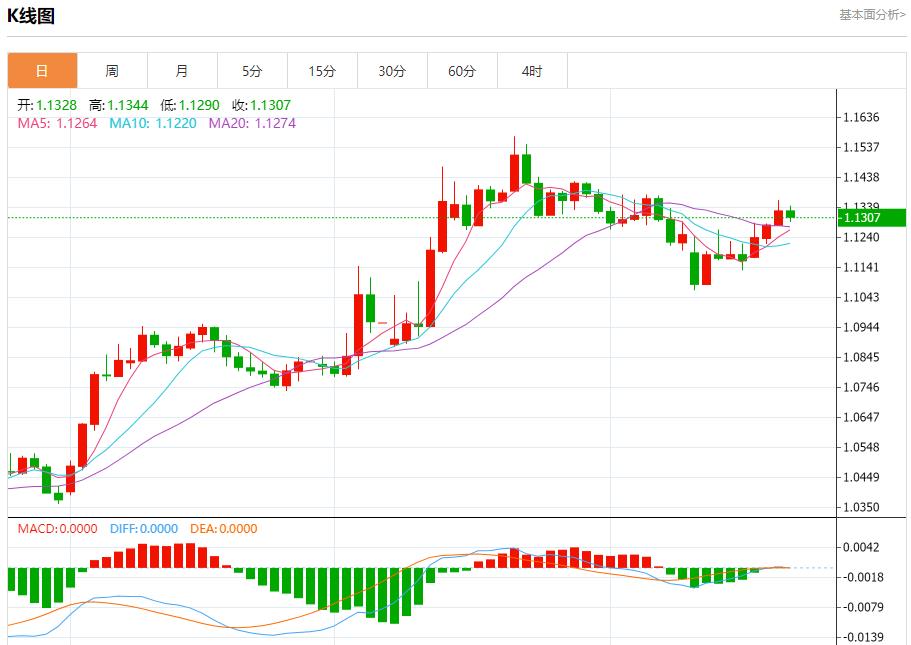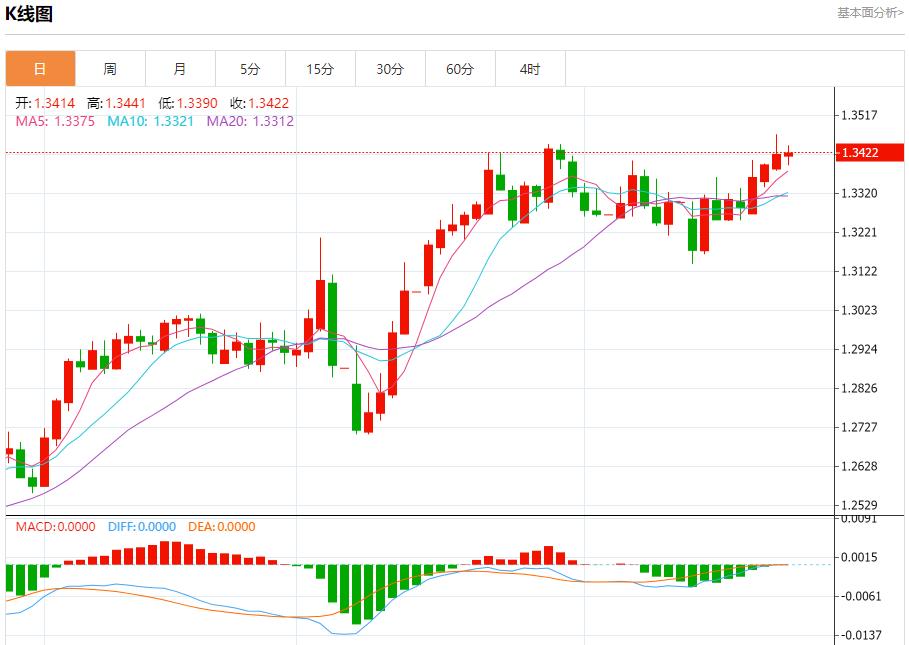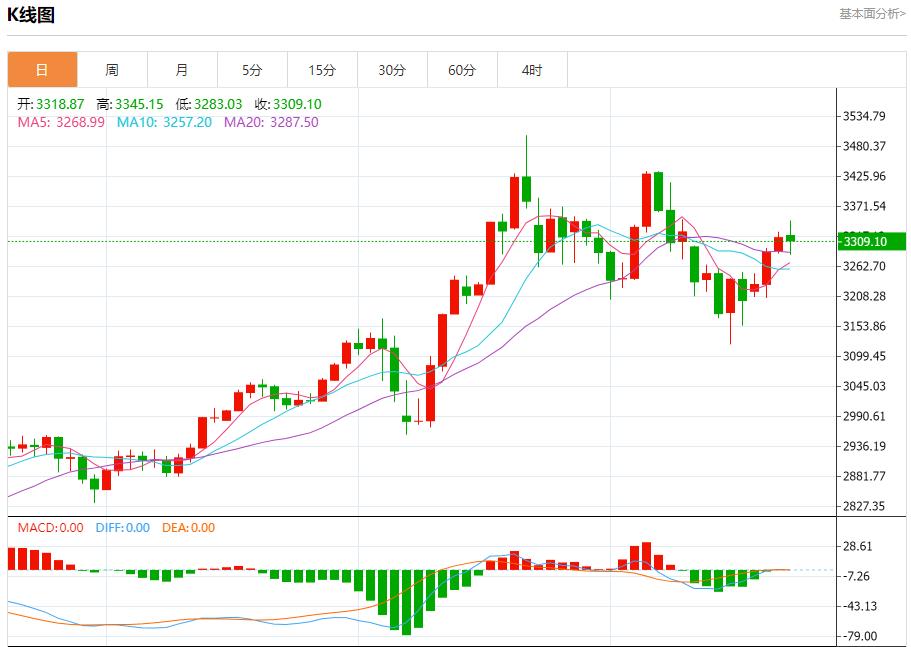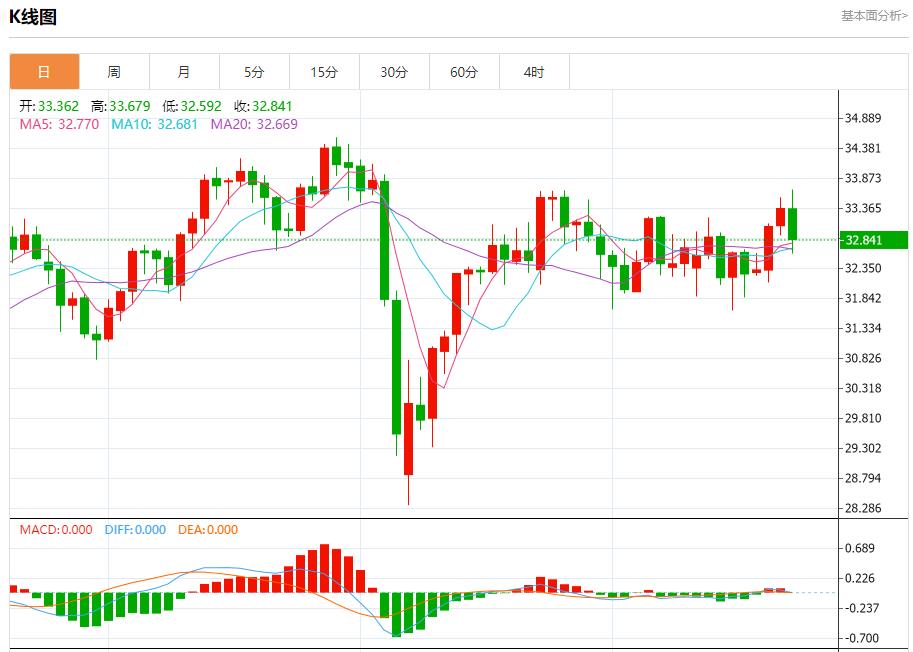Wonderful Introduction:
If the sea loses the rolling waves, it will lose its majesty; if the desert loses the dancing of flying sand, it will lose its magnificence; if life loses its real journey, it will lose its meaning.
Hello everyone, today XM Foreign Exchange will bring you "[XM Foreign Exchange Official Website]: UK business recession slows down, short-term trend analysis of spot gold, silver, crude oil and foreign exchange on May 22". Hope it will be helpful to you! The original content is as follows:
The three major futures indexes rose and fell, with Dow futures falling by 0.03%, S&P 500 futures rising by 0.15%, and Nasdaq futures rising by 0.24%. The European Stoke 50 index fell 0.62%, the German DAX30 index fell 0.50%, the UK FTSE 100 index fell 0.50%, the French CAC40 index fell 0.08%, and the Italian FTSE MIB index fell 0.44%.
⑴ The UK's business recession eased in May, but the manufacturing situation continued to deteriorate, and the layoffs were close to the fastest level since the global financial crisis. ⑵S&P Global Comprehensive Purchasing Managers Index (PMI) rose to 49.4 from 48.5 in April, in line with Reuters' survey expectations and is on par with the euro zone. ⑶ The UK economy, which dominates the service industry, returns to the growth range, while the manufacturing index declines due to the worst layoffs since May 2020. ⑷ Despite strong economic growth in the first quarter, the Bank of England believes that the potential growth rate is much weaker than the data performance, and the results of the PMI survey support this view. ⑸S&P Global Warnings That Britain's economy may contract in the second quarter. ⑹ RSM economist Thomas Pugh said that although the economy suffered the biggest impact in April, the economy is currently beginning to recover, but growth may remain unstable this year, and factors such as tariffs, uncertainty and taxes will continue to affect the economy. ⑺PMI shows that companies' confidence in the outlook has recovered, and concerns about US tariffs have decreased as U.S. and UK sign a deal lowerTariffs in key areas, and Trump suspended the imposition of high tariffs on other countries. ⑻S&P global chief economist Chris Williamson said that despite the improvement in the trade situation, companies are still cautious about the future. ⑻The pressure on corporate prices has weakened significantly in May, which may ease concerns among Bank of England officials about inflation. ⑽The service industry PMI rose from 49.0 to 50.2, but the new order contraction rate was the fastest since the end of 2022. ⑾The UK's service industry performed slightly better than France and Germany, but its manufacturing industry performed far worse than other countries. ⑿The manufacturing PMI dropped from 45.4 to 45.1, and the industry's employment index fell to its lowest level since the outbreak of the new crown epidemic.
The poll results conducted by the Japanese Current Affairs Communications Agency from the 16th to the 19th showed that the support rate of Ishiba's cabinet was 20.9%, a decrease of 2.2 percentage points from the agency's poll results last month, which is the lowest support rate in the agency's poll results since the establishment of the Ishiba's cabinet in October last year. In addition, the Ishipo Cabinet’s unsupported rate was 52.9%, up 1.7 percentage points from the previous month.
⑴On May 22, 2025, U.S. Treasury yields continued to rise in early trading, with the 30-year Treasury yield hitting 5.117%, the highest level since 2023. ⑵ David Sadkin, president of BelAir Investment Advisors, said the bond market is sending signals that inflation is still a major economic risk, which may come from tariffs, tax bills or a combination of the two. ⑶Sadkin said the current uncertainty is the highest memory he has in at least the past 17 years, and the last similar level of anxiety can be traced back to the financial crisis. ⑷ Some investors believe that the rise in Treasury yields is not due to expectations of strong economic growth, but because of investors' concerns about inflation and the widening gap in the U.S. government revenue and expenditure. ⑸JP Morgan CEO Jamie Dimon recently warned that the economy may face the risk of stagflation, that is, slowdowns in growth coexist with rising inflation, a situation that investors have not experienced since the 1970s and early 1980s.
European Central Bank meeting minutes show that ECB policymakers said last month that inflation in the euro zone was almost curbed, and that trade tensions may suppress prices in the short term even if trade channels may further trigger inflation. The ECB cut interest rates for the seventh time in a year last month and warned that economic growth would be hit hard by U.S. tariffs, which heightened bets on further easing policy in the coming months. "The ECB said in the minutes that confidence that inflation will return to its target level in the medium term is increasing, and the fight against inflation shock is nearing its end. Therefore, anti-inflation forces are likely to dominate in the short term." Although trade tensions have been large since the April meeting, the April meeting has beenThe degree has been alleviated, but the widespread uncertainty continues to suppress market sentiment, making people firmly bet that the ECB will cut interest rates again in June. However, some policy makers believe that in the long run, the trade war will lead to inflation. The minutes of the meeting added: "Given the destructive impact of destroying global value chains, these committee members believe that the trade shock is more likely to trigger inflation in the short term."
⑴India's 10-year Treasury yield fell below 6.25% in May, the lowest level in more than three years. ⑵This trend is thanks to the ceasefire agreement between India and Pakistan, which has brought the market back to its focus on lower interest rates and prudent fiscal prospects. ⑶ The RBI cut interest rates twice in a row after maintaining the benchmark repurchase rate at 6.5% (a high in more than four years) to curb the slowdown in domestic economic growth. ⑷ Latest inflation data show that price growth has been below the Bank of India's 4% target for the third consecutive month, falling to a six-year low, and the central bank is expected to continue to cut interest rates. ⑸ The RBI also injected a series of liquidity into commercial banks, which had previously exhausted domestic reserves in order to defend the rupee exchange rate, resulting in tightening financing conditions. ⑹ At the same time, the rupee is relatively stable, prompting foreign investors to reconsider buying Indian bonds, which in turn drives foreign capital into domestic fixed-income securities, especially after DBS and JPMorgan included Indian bonds into funds.
⑴ The Federal Reserve proposes to publish more detailed economic forecasts after some meetings as the basis for monetary policy discussions, but has been criticized by the president of the regional Federal Reserve Bank. ⑵ They are worried that it is difficult to reach a common outlook and may further confuse the public. ⑶Feder Chairman Powell stressed the need for improved communication last week, while former Chairman Benank suggested that Fed staff prepare economic reports and forecasts and release them four times a year after policy meetings. ⑷Benank said that issuing a "transparent, complete and comprehensive overall economic forecast" will help the outside world better understand the Fed's decision-making and subsequent trends, while emphasizing that alternative situations can allow decision makers to adjust more resilient when looking for changes. ⑸ Atlanta Federal Reserve Bank president Bostic questioned the added value of instant release of staff predictions, believing that this may be mistook as the basis for the committee's decision. ⑹Bostic pointed out that decision makers have 19 views, and there are 20 reports from staff, which makes it difficult to form a consensus. ⑺Cleveland Federal Reserve Bank President Hamake said that reaching a consensus forecast or several different situations is very challenging, and he is worried that publishing more information will mislead the public.
⑴ The euro zone comprehensive purchasing managers index (PMI) fell from 50.4 in April to 49.5 in May, indicating that economic activities may stagnate again. ⑵ ING economist Bert Colijn pointed out that the impact of trade conflicts on the economy is more reflected in uncertainty than inThe direct impact was that the data only showed that new overseas orders had dropped slightly, while manufacturing output even increased. ⑶ The service industry is the main reason for this economic slowdown, which was once the main driving force for economic growth in the euro zone. ⑷Colijn said that economic activity in the eurozone still faces downside risks in the short term, as trade conflicts may further intensify.
⑴ On May 22, the spot premium of the Middle East crude oil benchmark price (including Oman, Dubai and Murban) fell due to the market expectation that OPEC+ may increase production in July. ⑵ According to Bloomberg News, OPEC+ is discussing the possibility of further significant increase in production at its June 1 meeting. ⑶Pertamina, Indonesia, issued a tender, planning to purchase 900,000 barrels of crude oil and condensate for delivery in July and August for Cilacap refinery. The tender will be valid until May 23. ⑷ In Singapore cash trading, Dubai crude oil premium to swaps fell 25 cents to $1.21 a barrel.
⑴ In its annual economic assessment on Thursday, the International Monetary Fund (IMF) said in its annual economic assessment that France needs to take new and ongoing measures to control its budget deficits and stabilize rising debts. ⑵ The French government faced challenges in public finance, with spending significantly increased last year, tax revenues lower than expected, and parliamentary divisions led to difficulties in policy advancement. ⑶IMF expects the French public sector budget deficit to account for 5.4% of economic output, but warns that if no additional measures are taken, the deficit will remain around 6% in the medium term and debt will continue to rise. ⑷ The IMF recommends that France develop a set of "credible and well-designed measures" with a focus on rationalizing spending while better targeting welfare to those who need it most. ⑸ France needs to implement a budget tightening equivalent to 1.1% of GDP in 2026, and cut GDP by an average of about 0.9% per year in the medium term, which is basically consistent with the current government plan. ⑹ French Prime Minister Francois Bellu's minority government is working to cut the 40 billion euro budget to reduce the fiscal deficit to 4.6% of GDP next year, but many measures lack political support. ⑺ Due to the lack of a parliamentary majority, the Beiru government relies on the support of Socialist MPs to pass the budget bill and resist distrust motions from the extreme left and far right. ⑻IMF expects France's economy to grow by 0.6% in 2025 and 1.0% in 2026, slightly lower than the government's forecast of 0.7% and 1.2%.
⑴The Japanese government lowered its assessment of the global economy on Thursday, causing concerns due to uncertainty in U.S. trade policy. ⑵In May's monthly economic report, the Japanese government lowered its assessment of the U.S. economy for the first time in the past three years, saying its expansion is slowing. ⑶ The report pointed out that global economic growth is slowing down, and growth in some regions has stagnated, mainly affected by uncertainty in US trade policy. ⑷ Japanese Economic DiligenceHolding a "moderate recovery" assessment, but the downside risks brought by US tariffs are increasing. ⑸ The report also mentioned that the negative impact of rising prices on household consumption and sentiment, as well as the spillover effect of market fluctuations, are also downside risks faced by the Japanese economy. ⑹In the World Economic Outlook released on April 22, the International Monetary Fund lowered its global growth forecast for 2025 by 0.5 percentage points to 2.8%, mainly due to the impact of widespread US tariffs. ⑺U.S. trade policy uncertainty still disrupts global supply chains, curbs global demand and prompts companies to postpone investment plans. ⑻Japan's economy shrank by 0.7% in the first quarter, the first contraction in a year. Exports to the United States fell sharply in April, highlighting the impact of US tariffs on Japan's fragile recovery.
Euro/USD: As of 20:28 Beijing time, the euro/USD fell and is now at 1.1310, a drop of 0.19%. Before the New York Stock Exchange, the price of (Euro-USD) fell in recent intraday trading, and after reaching overbought levels, there was a negative signal on (RSI) in an attempt to gather positive momentum to help it recover and rise again while trading along a small bullish slash on a short-term basis.

GBP/USD: As of 20:28 Beijing time, GBP/USD rose, now at 1.3424, an increase of 0.03%. Before New York, (GBPUSD) prices rose on the last trading day as it prepared to attack the stubborn and critical resistance at 1.3440, supported by its ongoing trading above the EMA50 and led by a short-term major bullish trend and trading along a slash, the price successfully unloaded the apparent overbought conditions of (RSI), thus regaining positive momentum.

Spot gold: As of 20:28 Beijing time, spot gold fell, now at 3310.79, a drop of 0.13%. Before the New York Stock Exchange, the (gold) price fell in recent intraday trading, looking for a rising bottom as the basis, which may help it get the positive momentum it needs to recover, especially in the negative signal on (RSI), which relies on psychological support at $3,300 after reaching overbought levels, while trading is slightly bullish in the short and medium term.

Spot silver: As of 20:28 Beijing time, spot silver fell, now at 32.852, a drop of 1.54%. Before New York, the (silver) price fell in recent intraday trading, rebounding lower after reaching our previous report of $33.70,Trying to get a positive momentum that could help break through that resistance and trying to get rid of the obvious overbought state on (RSI), especially when bullish trends dominate on a short-term basis and trading along a slash, negative signals appear from there.

Crude oil market: As of 20:28 Beijing time, U.S. oil fell and is now at 60.640, a drop of 1.53%. Before the New York Stock Exchange, the (crude oil) price continued to decline in recent intraday trading, breaking the $61.20 support level, affected by the short-term exit from the bullish correction channel range, with continued positive pressure as it traded below the EAM50, and the price tried to unload some obvious oversold conditions on the (RSI), noting the beginning of the positive signal, which could slow down the price’s upcoming losses.

RHBBank Chief Economist and Head of Market Research Barnabas Gan said in a report that Singapore's GDP growth momentum may weaken further and enter a technical recession in the first half of this year. Singapore's economic outlook has become even more uncertain due to changes in global tariffs, trade relations and U.S. policy. Singapore's trade and manufacturing industry may face more resistance due to unpredictable global developments, especially starting in the second quarter. Singapore's GDP is expected to shrink by 2.4% in the second quarter, compared with a 0.6% decline in the first quarter.
The initial value of the euro zone PMI will be announced on Thursday. These data are one of the most closely watched data investors have, and they are unlikely to change the outcome of the ECB June meeting. "The PMI in May is likely not to change the ECB's decision in June, but it may have an impact on how things unfold in the summer," said Christopher, a researcher in Dansker Bank? Kaye? Ronholt said in a report. According to LSEG data, the market expects the ECB to cut interest rates by 25 basis points in June to be 90%.
The above content is all about "[XM Forex Official Website]: The British business recession slows down, and the short-term trend analysis of spot gold, silver, crude oil, and foreign exchange on May 22" is carefully compiled and edited by the editor of XM Forex. I hope it will be helpful to your trading! Thanks for the support!
Life in the present, don’t waste your current life in missing the past or looking forward to the future.